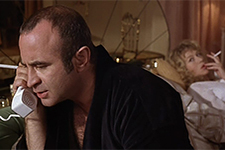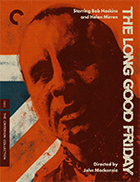The Long Good Friday (4K UHD)
|  Scottish poet Robert Burns famously reminded us in his 1785 poem “To a Mouse” that “The best-laid schemes of mice and men / Go oft awry.” And, while the vicious East End gangster antihero Harold Shand (Bob Hoskins) in The Long Good Friday is no mouse, his best-laid schemes definitely go awry, which turns the film into a brutal meltdown of amoral ambition. When we first meet Shand, he is striding out of London’s Heathrow Airport, the very picture of success and control. He has been plotting and scheming for years to be at the center of a major renovation of the dilapidated London dockyards (“The Docklands”) in preparation for the 1988 Olympics, which necessitates his partnering with local politicians and members of the American mafia, who he plans to wine and dine and impress into signing on the dotted line over the Good Friday weekend. Whether or not Shand can seal the deal becomes the film’s propulsive, driving narrative force, carried along at times by Francis Monkman’s highly stylized synthesizer score. The wheels start coming off when Shand’s best friend and business associate Colin (Paul Freeman) is murdered and a car bomb very nearly kills his own mother outside a church. The violence swirling around him and his associates is threatening primarily because it makes him look like he is not in control. And Shand is very much a man who needs to be in control and to convey that with conviction, as the American mobsters start getting cold feet at the prospect of getting into bed with someone who is in the crosshairs (the fact that the IRA becomes a major factor in the plot does him no favors). Shand has to figure out who is targeting him, which means that his time must be spent hunting down and interrogating rivals and old enemies. His project relies on a careful balance between the wealth and power he has accumulated through years of criminal enterprise (involving everything except narcotics) and the need to work with “legitimate” partners like Councillor George Harris (Bryan Marshall), whose support is vital and tenuous (like the American mafia, Harris can’t be seen cavorting with chaos, which not-so-ironically links organized crime and government). Shand’s best assets are Parky (Dave King), his devoted righthand man, and Victoria (Helen Mirren), his longtime girlfriend who is every bit as cunning and vicious as he is, but unlike Shand is much better at containing it beneath a veneer of grace, charm, and eloquence (at one point she tells another character that she used to play lacrosse with Princess Anne, and we believe her). The screenplay was written by Barrie Keefe, who worked primarily as a stage dramatist, although he began his writing career as a journalist with the Stratford Express, which helped inform many aspects of The Long Good Friday (as he told an interviewer for The Guardian, “I met a lot of gangsters …”). Socially and politically attuned, Keefe was long intrigued and unsettled by the transformation of London in the post-World War II years, which is why the centerpiece of his screenplay is Shand’s desire to meld criminal and political enterprise in redeveloping a major part of the city to his own financial benefit. Director John Mackenzie had started his career in television and worked as an assistant director for Ken Loach, although nothing in his previous work suggested what he would achieve with The Long Good Friday, which remains his best film (unfortunately, none of his subsequent work in either the U.K. or the U.S. would rise to this level). The film is held at all times by Hoskins’s intense, breakout performance as Shand, which gives the constant impression of a man who is always about to explode. He is at his most serene at the beginning of the film when all appears to be going well and his new kingdom seems sure of being minted; but, once things start going wrong and blood starts flowing, Shand’s inner animal starts clawing its way out. Shand proves to be a man of no small brutality, best exemplified in the scene in which he has all of his rivals rounded up and hung upside down on meathooks in a abattoir. Nothing horrible happens to them, but the constant threat of violence is stark, as is Shand’s willingness to humiliate them for his own gain. The only time he is really held in check is when his violence erupts on Victoria, who is too tough a moll to put up with it. Hoskins and Mirren make a formidable pair; their emotional tension matches the physical violence around them, which makes The Long Good Friday into a true powder keg of a gangster melodrama. The ending isn’t a surprise, but is has a painful bite anyway.
Copyright © 2024 James Kendrick Thoughts? E-mail James Kendrick All images copyright © The Criterion Collection | |||||||||||||||||||||||||||||
Overall Rating: 


 (3.5)
(3.5)


